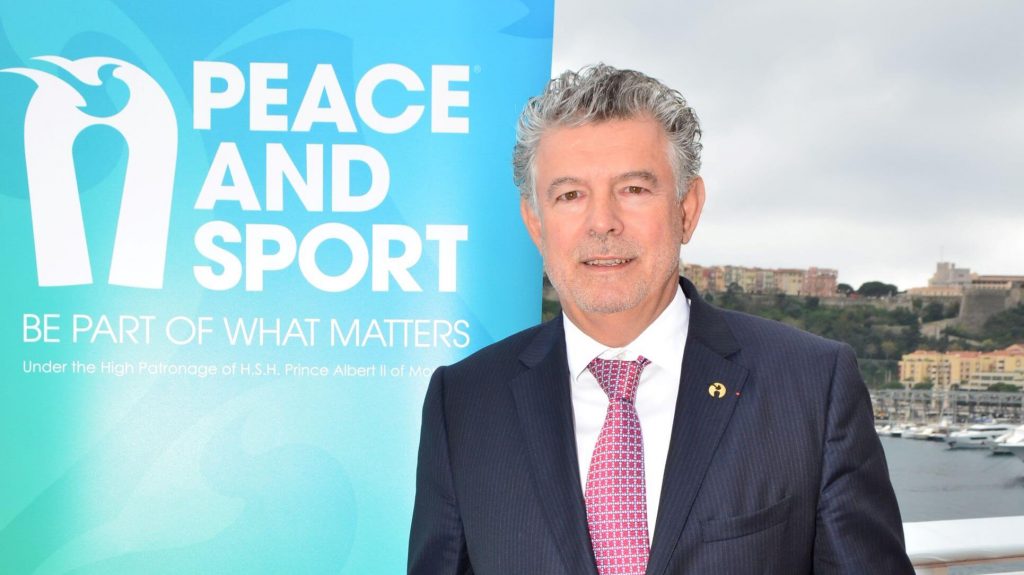Tokyo 2020 Olympic Games: 5 questions to Joël Bouzou, president and founder of Peace and Sport

The Tokyo 2020 Olympic Games were a very special edition. Postponed, then on the verge of cancellation, the Games were finally maintained with a limited number of spectators. The President and Founder of Peace and Sport, Joël Bouzou, reflects on these extraordinary Games for Monaco Tribune. Interview.
1. The Tokyo Games have officially come to an end with the closing of the Paralympic Games on Sunday 5 September. Overall, what did you take from this very special edition?
The Olympic Games were held despite the pandemic and both the International Olympic Committee and Japan took effective measures to contain the health risk. “Moving forward” was the theme of these Games, as the Covid-19 pandemic killed more than 4 million people and disrupted the lives of billions. The athletes performed and carried a message of hope and resilience through sport.
The fact that there were very few spectators meant that there were more expressions of solidarity between athletes. For example, we witnessed Renaud Lavillenie encouraging Armand Duplantis in the pole vault, despite his own defeat.
2. What actions did you take in relation to the 2020 Olympic Games?
As an Olympian, President and Founder of Peace and Sport and President of the World Olympians Association, I wanted athletes to get involved in solidarity actions during the Games and I created a digital version of the “OLY House”, a virtual space that allows Olympians to connect with their community. On this occasion, 5 Olympians were named “Olympians for Life” and we collected thousands of signatures from members on an “OLY House” virtual wall. The “OLY House” was a solution to be together despite it being impossible to gather physically.
I would also like to commend the Champions for Peace, high-level athletes who are socially committed to Peace and Sport and who reaffirmed the values of solidarity, inclusion and equality through sport at the Games. Through his role as flag bearer and his participation in the gymnastics events, Champion for Peace Samir Aït Said was a symbol of perseverance and discipline for the athletes and a source of inspiration for young people. Champion for Peace Mutaz Essa Barshim, by sharing the high jump gold medal rather than putting it on the line in a jump-off with Gianmarco Tamberi, sent a strong message of friendship, a core value of Olympism.
Other athletes, such as Costa Rican Luciana Alvarado, also used the Games as a platform to demand equal rights
3. This edition saw a record participation of women in the competition (49%), what does this figure mean to you and how can it be improved?
Women had no place in the ancient model of the Games that Pierre de Coubertin tried to recreate and they took part in the Games for the first time in 1900. The increase in women’s participation is evidence of a change in status at an international level and the rise of the principle of equity. Nevertheless, we must remain committed to preserve these gains and more measures for gender equity must be put in place in some areas of the world.
The Tokyo Games, by achieving parity, provided a unique platform for women to assert their rights. Through her participation in the Olympic refugee team, Afghan cyclist Masomah Ali Zada, for example, advocated for Afghan women and all women. In defending her freedom to practice a sport, she said she won the fight “against people who think that women don’t have the right to ride a bike”. Other athletes, such as Costa Rican Luciana Alvarado, also used the Games as a platform to demand equal rights.
4. Do you think the Olympic Games should merge with the Paralympic Games to compete under one banner?
The merger of the French Olympic and Paralympic teams, which united under the same banner, sent a strong message at the opening ceremony of the Tokyo Games. It also underlined the importance of strengthening the media coverage of the Paralympic Games and changing the way Paralympic athletes are viewed for their performance, as they strive for the same excellence as Olympic athletes.
However, a merging of the two events is not possible for the moment as the Olympic Games and the Paralympic Games are organised by different entities, the International Olympic Committee and the International Paralympic Committee.
In addition, the simultaneous organisation of the two events would present significant logistical challenges as it would mean doubling the capacity of the Olympic Village. In addition, maintaining a two-week gap between the Olympic and Paralympic Games is essential as it allows for the development of certain facilities for athletes with special needs.
Several athletes mobilised to denounce racism, racial injustice and all forms of discrimination
5. Taking the knee, fists in the air, sharing gold medals… What do all these demonstrations inspire for the future?
The evolution of the Olympic Charter marks an important step in amplifying the scope of the athletes’ voice; they become “role models” who contribute to the construction of a fairer future. Beyond their performance during sporting events, athletes can transmit powerful messages of solidarity, unity and dialogue, defend social ideals and contribute to the reflection on global issues.
Following the example of the British women’s football team, the American hammer thrower Gwen Berry and the captain of the German hockey team Nike Lorenz, several athletes took action to denounce racism, racial injustice and all forms of discrimination.
Moreover, the match between the Saudi judoka Tahani Al-Qahtani and the Israeli Raz Hershko, even though official relations between the two countries are limited and they have little common history of sporting competition, illustrated the capacity of sport to create bonds of friendship between peoples and to overcome prejudices. I would like to acknowledge the positive influence of the International Judo Federation and its President. The positive actions of athletes at sporting events demonstrate that sport is a neutral framework of equity. These acts contribute to peaceful diversity, to living together and to building more just and inclusive societies. Nevertheless, no athlete, even on the basis of his or her convictions, has the right to rob the other two athletes on the same podium of the eternal memory of this solemn ceremony. It is therefore imperative that these mobilisations take place outside the podium, in accordance with the Olympic Charter.
Peace and Sport is a neutral international organisation based in Monaco, using sport and its unifying values as an instrument for peace throughout the world.













